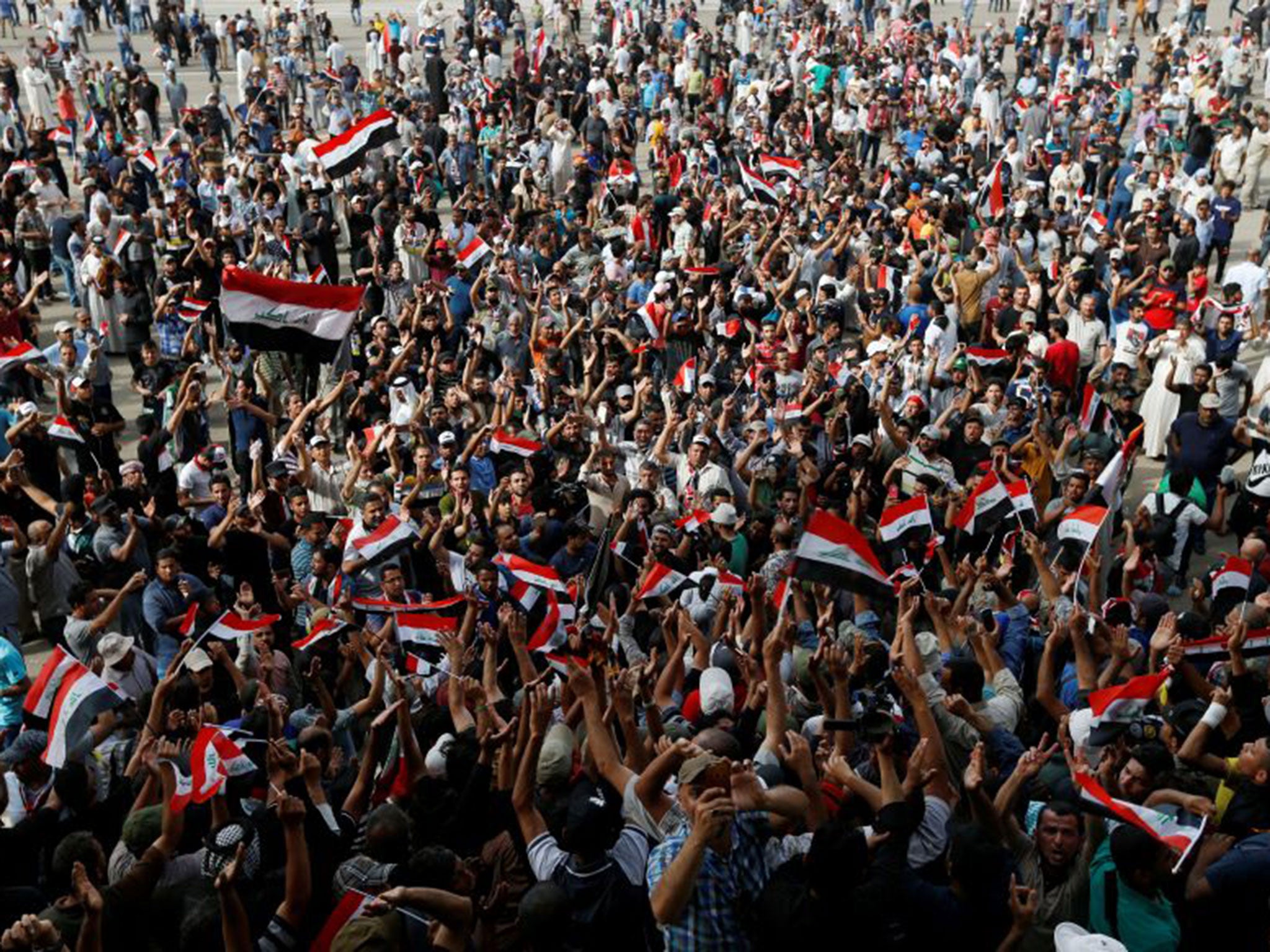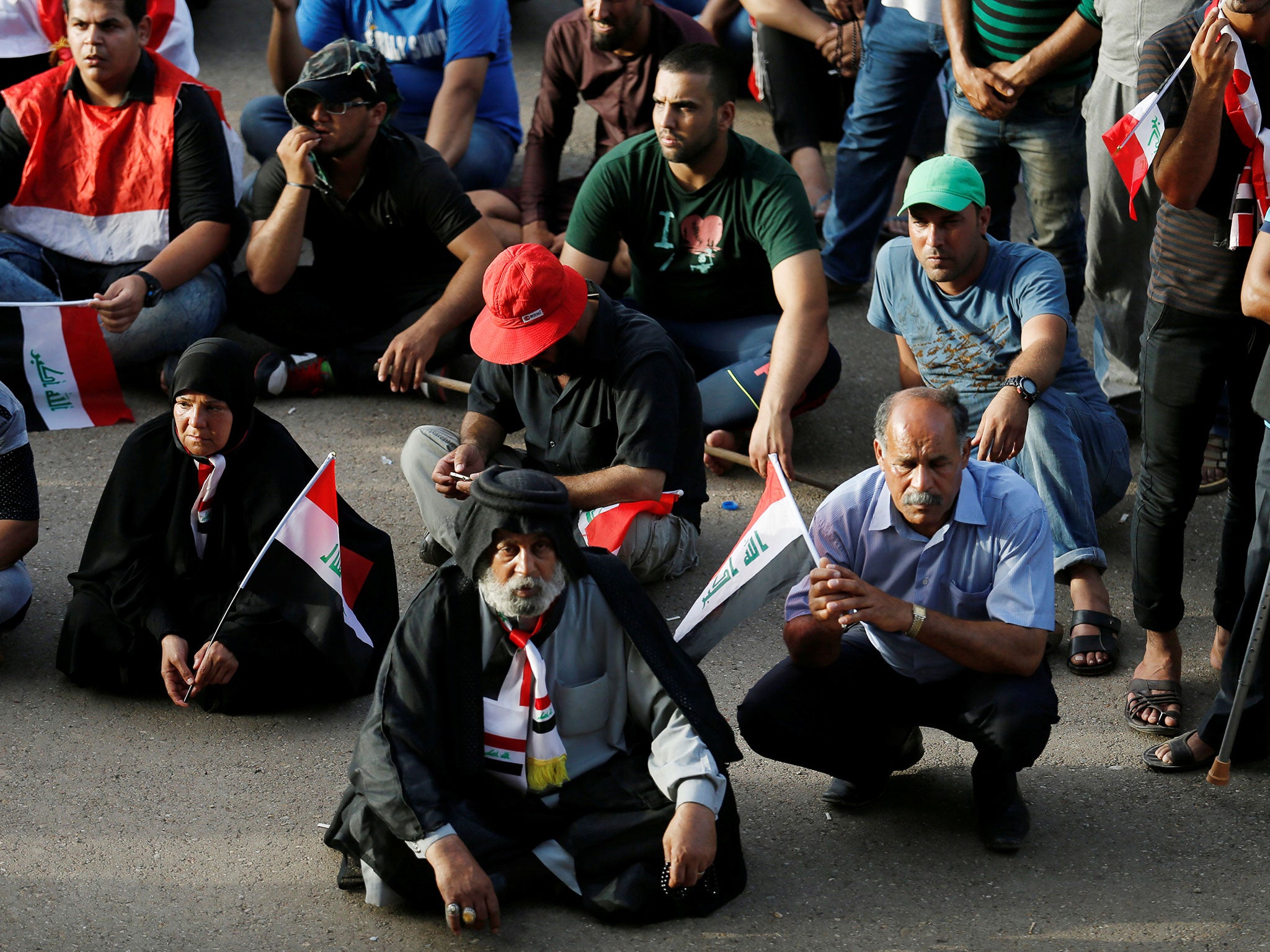The protesters in Iraq's Green Zone show the vulnerability of the country's ruling elite
The ease with which supporters of populist nationalist cleric Muqtada al-Sadr took over parliament without resistance from the security forces makes the state look even more weak and ineffectual

Your support helps us to tell the story
From reproductive rights to climate change to Big Tech, The Independent is on the ground when the story is developing. Whether it's investigating the financials of Elon Musk's pro-Trump PAC or producing our latest documentary, 'The A Word', which shines a light on the American women fighting for reproductive rights, we know how important it is to parse out the facts from the messaging.
At such a critical moment in US history, we need reporters on the ground. Your donation allows us to keep sending journalists to speak to both sides of the story.
The Independent is trusted by Americans across the entire political spectrum. And unlike many other quality news outlets, we choose not to lock Americans out of our reporting and analysis with paywalls. We believe quality journalism should be available to everyone, paid for by those who can afford it.
Your support makes all the difference.Iraqis bursting into the Green Zone in Baghdad over the weekend were able to see for the first time the palatial homes and offices of the corrupt and dysfunctional Iraqi leadership that has misgoverned the country for the last 13 years.
As the security forces stood aside, protesters toppled a section of the 15-foot-high blast walls and poured through the gap into this well-fortified and exclusive enclave on the banks of the Tigris and in the centre of the Iraqi capital. After taking over the parliament building, the crowd chanted the name of the Shia populist nationalist cleric Muqtada al-Sadr, to whose movement many of the protesters belong, and denounced the failures of the present government of Prime Minister Haider al-Abadi.
The Green Zone, with its fountains and well-watered lawns, has long been a hated symbol of the isolation of the rulers of Iraq who never experience the harsh living conditions and shortages endured by ordinary Iraqis. By breaching its walls, the demonstrators who splashed in the fountains and took pictures of themselves on the lawns showed that the Iraqi elite is more vulnerable than in the past to expressions of popular anger.
Mr Sadr’s stated aims are reform rather than revolution: he does not want Mr Abadi to resign, but he does want him to appoint a cabinet of technocrats and to end the quota system by which the sectarian or ethnically based parties appoint loyalists regardless of their abilities. This is opposed by existing parties, which operate extensive client and patronage systems. At least 8,000 of Iraq’s bureaucrats – some put the figure as high as 25,000 – are political appointees who are notorious for their corruption and incompetence.
Mr Sadr’s purpose may be to strengthen the Iraqi state and make it more effective and honest. But the very ease with which the Sadrists and their supporters penetrated the Green Zone and took over parliament without resistance from the security forces makes the state look even more weak and ineffectual.
Though the Sadrists say that many of the protesters do not belong to their movement, they appeared to have the eruption into the Green Zone very much under control from the beginning. Sadrist stewards prevented equipment in parliament being smashed and say they cleaned up the parliamentary chamber on leaving. The well-disciplined exodus of protesters from the zone on Sunday without any looting shows the degree to which the action was organised by the Sadrist movement.
“The people are saying that if the government does not appoint a government they will be back [to take over the Green Zone again],” a Sadrist leader, who did not want his name published, told The Independent. He believed that the other political parties had been hoping that the protests would get out of hand and lead to the ransacking and looting of the Green Zone which would have provided an excuse for the Iraqi security forces to use force against the demonstrators. “The parties hoped for chaos so the army would clear away the protesters,” he said. He did not think that the other Shia movements were in a position to use their militias against protests that have mass support.
There is deep anger among most Iraqis of all classes against a ruling elite that is seen as having stolen much of Iraq’s oil revenues since 2003. The sense of crisis was exacerbated by the disintegration of the large and expensively equipped Iraqi army in 2014 when it was attacked by much smaller Isis forces. But the alarm today is less to do with Isis, which has been losing ground, and more to do with the fall in the price of oil, which means the government is fast running out of money. The state is by far the biggest employer in Iraq, paying some seven million people out of a population of 33 million as employees or pensioners. This costs $4bn (£2.73bn) a month but oil revenues have been running closer to $2bn.

The Sadrist leader said that Mr Sadr was aware of the difficulty of reforming the corrupt Iraqi administration. He said that “we can’t change hundreds of director generals and thousands of officials, but we have to start somewhere.” He added that independent ministers could push for changes in important financial institutions like the Central Bank, where those in charge were often only acting officials connected to the ruling Dawa Party, though they should have been approved by parliament under the Iraqi constitution.
Mr Sadr, who comes from a clerical family famous for its opposition to Saddam Hussein, has a devoted following among the Shia poor. He led his Mehdi Army militia against the US occupation in 2004, fighting two battles against US troops in the Shia holy city of Najaf, but he later dissolved the Mehdi Army amid accusations that it was centrally involved in the murder of Sunni during the sectarian killings of 2006-7 when tens thousands were killed.
In an interview with The Independent in the Shia holy city of Najaf in 2013, Mr Sadr forecast that “the near future of Iraq is dark”, saying that the unity and independence of the country was endangered by Sunni-Shia hostility. He warned against the marginalisation of the Sunni and said that the danger was that because of sectarianism “the Iraqi people will disintegrate and it will be easy for external powers to control the country”. He remains adamantly opposed to intervention from the US, UK, Iran, Turkey or Saudi Arabia and the Gulf states, asserting that they always make the crisis in Iraq worse. The protesters who stormed the Green Zone at the weekend shouted both anti-American and anti-Iranian slogans.
Mr Sadr comes across as politically astute and cautious about what he says and does, quite contrary to his image in the West a few years ago when he was portrayed as “a firebrand cleric”. He said that the problem in Iraq is that the Iraqis generally have been traumatised by the last half a century, during which there has been “a constant cycle of violence: Saddam, occupation, war after war, first Gulf war, then second Gulf war, then the occupation war, then the resistance – this would lead to a change in the psychology of Iraqis.”
Patrick Cockburn is the author of “Muqtada: Muqtada al-Sadr, the Shia Revival, and the Struggle for Iraq”, published by Scribner (US) and Faber and Faber (UK).
Join our commenting forum
Join thought-provoking conversations, follow other Independent readers and see their replies
Comments